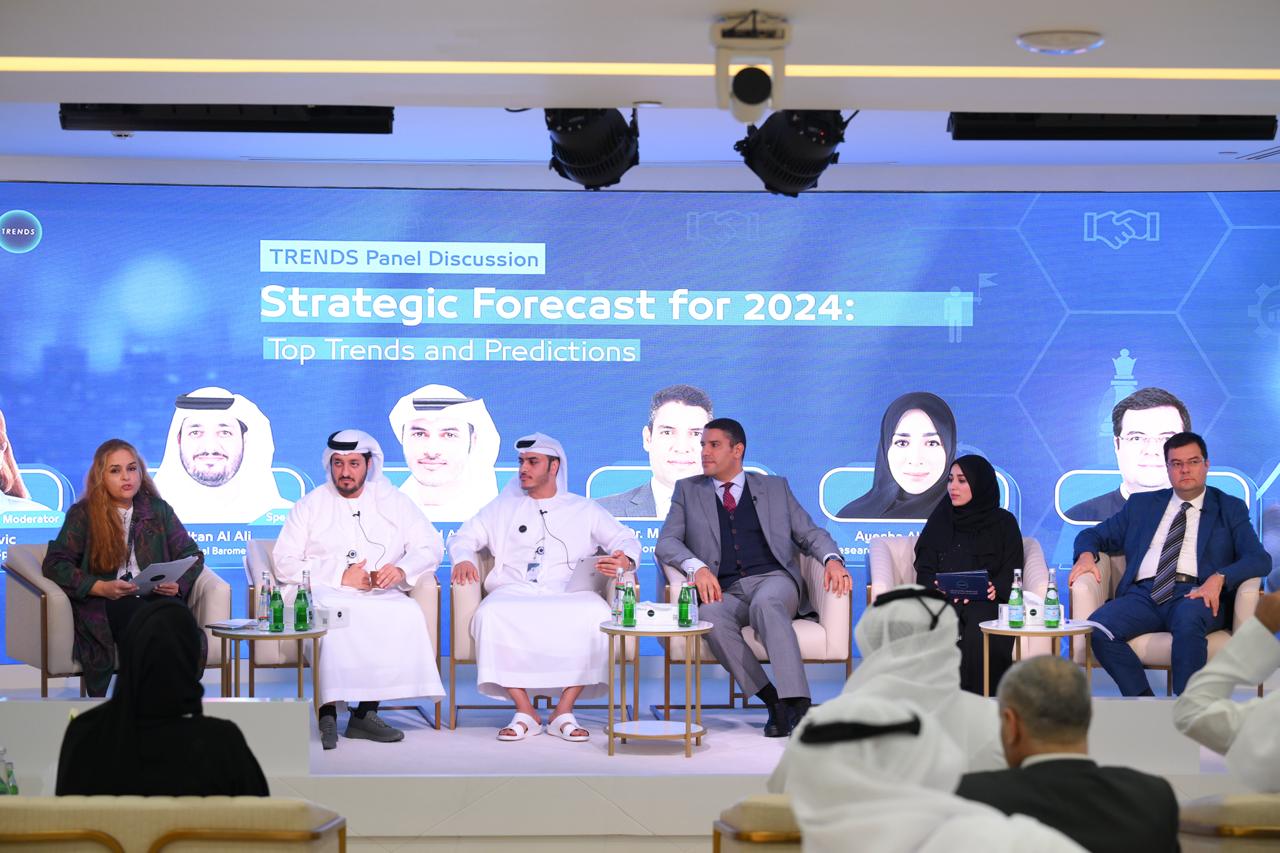Trends Research and Advisory launched its 2024 cultural season. The Center’s researchers contributed to the panel discussion for which focused on their strategic expectations and assessments for 2024. The panel discussion falls in line with Trends’ forward-looking vision and analysis of current and expected events.
The event began with a contribution by Sultan Majid Al-Ali, Director of the Global Barometer Department at TRENDS. He explained that about 60 countries in the world will witness presidential or legislative elections during 2024, led by the United States of America, India, France and Britain. He indicated that artificial intelligence will play a major role in the processes of understanding the sociological reality and voting behaviour of voters, especially with regard to setting priorities and interests.
Sultan said that in light of the rapid development of artificial intelligence, there are fears of exploiting modern technologies to influence the results of these elections in various ways, such as promoting disinformation, using deepfakes, and others.
Researcher Aisha AlRumaithi, Director of the Research Department at TRENDS, said that there is broad agreement among experts that the current international order is moving towards multilateralism, and that the United States and China will be at the forefront of these rivalry. Some analysts believe that Germany will be one of the pillars of the unfolding international system.
AlRomaithi explained that one of the most important international phenomena in 2023 is the growing arms race, the increase in competition over artificial intelligence, and the return of the scramble for Africa. The state of world peace in 2024 seemed threatened by the increase in the arms race.
She explained that the African continent will witness intense economic and strategic competition between major powers, especially the United States, China, Russia, France, Britain, and even some regional powers. Africa is one of the most promising emerging markets for foreign investment.
Political Islam researcher Hamad Al-Hosani addressed the current strategy of terrorism in the Arab world in 2024. He suggested that ISIS will continue to escalate its attacks in Syria. The organization still poses a tangible threat in the Syrian arena, especially in the Badia region and the north.
One of the important factors that encouraged the group to escalate attacks in Syria recently was the presence of a number of terrorist camps, most notably the Sphinx, which has become an organizational extension of ISIS, through which it can spread its ideas and attract new recruits, he said.
On the economic situation, Dr. Mohamed Youssef Afifi, an expert in economic affairs, said that the rise of international blocs during 2024 is determined by the potential growth in the bloc’s incentives of supporting regional stability, and the degree of growing protectionism at the international level. He expects a positive impact of the rise of these blocs on global economic growth, which is expected to reach about 2.4%..
He pointed out that it is clear that the United States’ indebtedness continues to worsen. He expects the continued pressures on budgets in the European Union, especially in the German economy, with the possibility of a decline in financial sustainability indicators in developing countries. Dr. Mohamed Afifi expects the continuation of exchange rate crises in a number of developing countries that are heavily indebted and currently threatened with financial distress.
Major economies are likely to make serious attempts to maintain a smooth or soft changes in global economic performance, which means avoiding widening the base of international armed conflicts and trying to contain transport sector crises.
Dr. Serhat Kabukglo, senior researcher at Trends, said the victory of Taiwan’s pro-independence Democratic Progressive Party (DPP) candidate Lai Chang Tee for the presidency in Taiwan would increase the likelihood of escalation and great power competition for disputed areas/islands in the South China Sea.
China is building more ships, importing more oil and gas, and exporting more goods to the world than any other country in the world. He indicated that the Chinese navy is building more submarines, destroyers and supersonic missiles than the United States. China claims superiority over the Western Pacific, and can squeeze Taiwan’s naval arteries at the expense of US interests in the region.
Dr. Serhat explained that the war between Russia and Ukraine has turned into a semi-stalemate conflict while the war continues along the 600-mile frontline without any major breakthrough. The war scenarios depend on the outcome of the US elections in November. He expects a state of stalemate and long-term war or a peaceful settlement through regional concessions. Dr. Serhat stressed that the latter possibility depends on dialogue and negotiations between the United States and China.
The panel discussion was moderated by Alma Hakirevic, senior specialist in the conference department. She referred to the importance of the panel in promoting scientific research and seeking to develop insights that help explore events in a balanced scientific manner.



